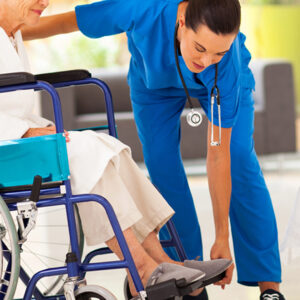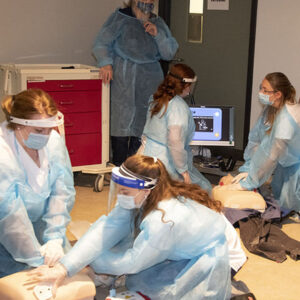5 Ways Hospitals Can Ensure Patient Safety
Patient Safety refers to practices aimed at reducing risks, preventing errors and accidental harm to patients during their treatment. It is fundamental in delivering quality healthcare services and improving patient outcomes.
However, patient harm is still a major global public health challenge, with millions of adverse events occurring in hospitals every year due to unsafe care.
According to National Health Service (NHS) England, there were around 2 million patient safety incident reports filed in just one year. The report further stated that 13% of the identified preventable harm causes led to prolonged or permanent disability and in some cases, death.
In this blog post, we will explore five ways hospitals can ensure patient safety and lower the risk of avoidable harm.
Infection Prevention and Control Measures
Infections are one of the most common causes of patient harm in hospitals, especially in low and middle-income countries where they account for more than half of all adverse events. Infections can be caught from the environment, other patients, health care workers or medical devices. They can lead to serious complications such as sepsis, organ failure or death.
Thus, implementing measures which prevent and control infections are a must to avoid patient harm.
These measures are as follows:
- Healthcare Workers must wash their hands with soap or use alcohol-based hand rubs before and after contact with the patient and their surroundings.
- Regular cleaning and disinfection of surfaces, equipment and instruments that may be contaminated with germs.
- Proper sterilisation of reusable medical devices such as surgical instruments or endoscopes before use.
- Promotion of rational use of antibiotics and other antimicrobial agents to prevent resistance and adverse reactions.

Fall and Injuries Prevention
Falls are another common cause of patient harm in hospitals, especially among older adults who may have impaired mobility, balance or cognition. Falls can result in fractures, head injuries or other trauma that may require additional treatment or surgery.
These injuries can also lead to permanent or temporary disabilities and prove to be fatal in the most unfortunate of cases.
To prevent falls and injuries from occurring, hospitals should:
- Routinely identify patients who are at high risk of falling based on factors such as age, medication use, medical conditions or previous falls. Additional resources should be spent in monitoring these high-risk patients.
- Provision of interventions such as bed rails, alarms, floor mats etc, and education to patients for maintaining their own safety. This reduces fall hazards and increases awareness of fall prevention among patients and staff.
- Record and analyse fall data to identify trends, causes and areas for improvement.

Reduction in Medical Errors
Medication errors are mistakes that occur during prescribing, dispensing, administering or monitoring of drugs.
They can cause adverse drug events (ADEs) such as allergic reactions, overdoses, interactions or side effects. According to a report from World Health Organisation (WHO), medication errors are more likely to occur in primary and outpatient health care settings where up to 80% of the harm is preventable.
In order to reduce medication errors, hospitals should:
- Verify and re-verify medication prescriptions at every point of transition such as when patients receive prescriptions from their doctor or when prescriptions are given to dispensaries.
- Use electronic systems that allow prescribers to enter orders directly into a computerised database. The database checks for errors such as incorrect doses, drug names or frequencies.
- Use scanners that read barcodes on medications and patients’ wristbands to ensure correct identification and administration.

Improvement in diagnosis accuracy
Diagnostic errors are failures to establish an accurate or timely explanation for a patient’s health problem. They can lead to delayed treatment, mismanagement, unnecessary tests or procedures, and missed opportunities for prevention.
However, the New York Times reported that diagnostic accuracy is fiendishly difficult to measure precisely. It is estimated that diagnostic errors affect about 1 out of 10 diagnoses made by clinicians.
Regardless, hospitals should always strive to reduce diagnostic errors and improve patient safety. According to Advisory Board, the best way to reduce diagnostic errors is to provide targeted training and education to nurses, pharmacies, and allied health professionals.

Communication with Patient and Staff
Patients must always be involved in conversations surrounding the topic of patient safety. Patients and family members should be encouraged to participate as advisors to promote better communication between them and healthcare workers from the point of admission.
Likewise, the medical staff are a good resource on ways to improve patient safety as they spend the most amount of time with the patients and are acutely aware of their causes and concerns.
Emphasising teamwork and being honest with staff about their role in patient safety can make a big difference in your hospital’s culture and attitude toward preventing errors.

Recruit Nurses Trained to Maximise Patient Safety
IFANGlobal is a worldwide healthcare recruitment agency possessing over two decades of rich experience training healthcare professionals for international medical institutions.
Through our dedicated medical training programmes we train Nurses and other important medical staff to ensure only the highest levels of patient safety in your hospital. This ensures quality delivery of quality healthcare services and improvement in patient outcomes across the board.
When your healthcare institution recruits from IFANGlobal, you can rest assured that you are getting the candidates with the best track record of maintaining patient safety and quality patient care.
So, if you are looking to enhance patient safety in your healthcare institution by hiring trained and verified medical staff, connect with us today. For more information, you can email us at info@ifanglobal.com or connect with us here.
